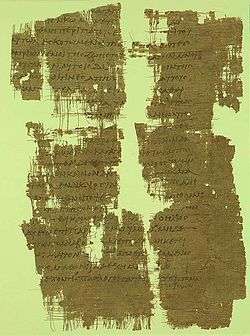Ephesians 3
| Ephesians 3 | |
|---|---|
|
A fragment showing Ephesians 4:16-29 on recto side of Papyrus 49 from the third century. | |
| Book | Epistle to the Ephesians |
| Bible part | New Testament |
| Order in the Bible part | 10 |
| Category | Pauline epistles |
Ephesians 3 is the third chapter of the Epistle to the Ephesians in the New Testament of the Christian Bible. It is authored by Paul of Tarsus.[1][2]
Text
- The original text is written in Koine Greek.
- Some most ancient manuscripts containing this chapter are:
- Papyrus 46 (ca. AD 200)
- Codex Vaticanus (AD 325-350)
- Codex Sinaiticus (AD 330-360)
- Codex Alexandrinus (ca. AD 400-440)
- Codex Ephraemi Rescriptus (ca. AD 450; complete)
- Codex Freerianus (ca. AD 450; extant: verses 6-8, 18-20)
- Codex Claromontanus (ca. AD 550)
- This chapter is divided into 21 verses.
Structure
This chapter can be grouped (with cross references to other parts of the Bible):
- Ephesians 3:1-7 = The Mystery Revealed
- Ephesians 3:8-13 = Purpose of the Mystery
- Ephesians 3:14-21 = Appreciation of the Mystery
Verse 4
- by which, when you read, you may understand my knowledge in the mystery of Christ),[3]
Verse 9
- and to make all see what is the fellowship of the mystery, which from the beginning of the ages has been hidden in God who created all things through Jesus Christ;[4]
Verse 16
- that He would grant you, according to the riches of His glory, to be strengthened with might through His Spirit in the inner man,[5]
- That he would grant you according to the riches of his glory
Or according to, and out of that rich, plenteous, and glorious fulness of grace and strength in Christ Jesus.[6]
- To be strengthened with might by his Spirit in the inner man;
this is the petition which the apostle puts up on his bended knees to the Father of Christ, that he would strengthen these saints, that so they might not faint at the tribulations which either he or they endured. Believers in Christ need fresh supplies of strength to enable them to exercise grace, to perform duties, to resist Satan and his temptations, to oppose their corruptions, and to bear the cross, and undergo afflictions cheerfully, and to hold on and out to the end: this is a blessing that comes from God, and is a gift of his free grace; a "grant" from him who is the strength of the lives of his people, of their salvation, of their hearts, and of the work of grace in their hearts: the means whereby the saints are strengthened by God, is "his Spirit"; who strengthens them by leading them to the fulness of grace and strength in Christ, by shedding abroad the love of God in their hearts, by applying the promises of the Gospel to them, and by making the Gospel itself, and the ordinances of it, useful to them, causing them to go from strength to strength in them: the subject of this blessing is the "inner man", or the Spirit, or soul of man, which is the seat of grace; and this shows that this was spiritual strength which is here desired, which may be where there is much bodily weakness, and for which there should be the greatest concern; and that this strength is not naturally there, it must be given, or put into it. This last phrase,[6]
- in the inner man,
is joined to the beginning of the next verse in the Arabic, Syriac, and Ethiopic versions, "in the inner man Christ may dwell"[6]
See also
- Holy Spirit
- Jesus Christ
- Other related Bible parts: Romans 8, 2 Corinthians 1, Ephesians 1
References
- ↑ Halley, Henry H. Halley's Bible Handbook: an abbreviated Bible commentary. 23rd edition. Zondervan Publishing House. 1962.
- ↑ Holman Illustrated Bible Handbook. Holman Bible Publishers, Nashville, Tennessee. 2012.
- ↑ Ephesians 3:4
- ↑ Ephesians 3:9
- ↑ Ephesians 3:16
- 1 2 3 John Gill's Exposition of the Entire Bible, - Ephesians 3:16
External links
| |||||||||||||||||||||||||||||||||||
